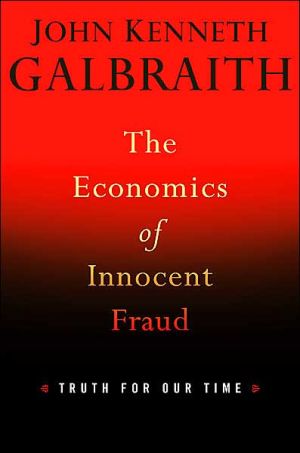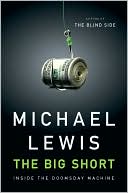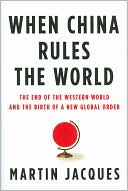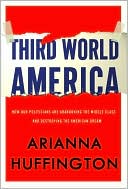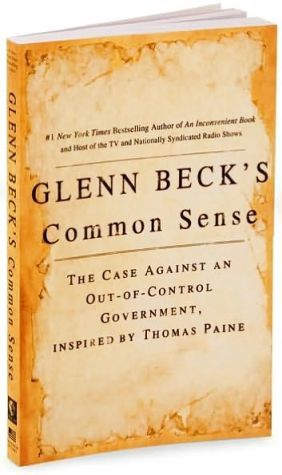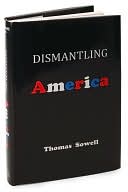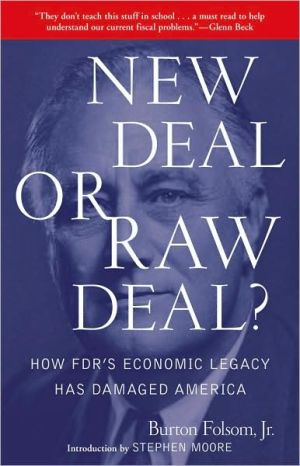The Economics of Innocent Fraud: Truth for Our Time
John Kenneth Galbraith has long been at the center of American economics, in key positions of responsibility during the New Deal, World War II, and since, guiding policy and debate. His trenchant new book distills this lifetime of experience in the public and private sectors; it is a scathing critique of matters as they stand today.\ Sounding the alarm about the increasing gap between reality and "conventional wisdom"—a phrase he coined—Galbraith tells, along with much else, how we have...
Search in google:
The primary aspect of the "fraud" of the American economy that Galbraith (emeritus, economics, Harvard U.) criticizes is the false pretense of shareholder control over corporations, when in fact all real power has shifted to corporate managers. Contradicting conventional wisdom, or "approved belief" in his words, he denies the distinction between the private and public sectors, describing how the managerial class has unprecedented power in the economy's public sector, including major influence over important policies of war or peace. In the end, the continuing references to an impersonal market are "a not wholly innocent fraud." Annotation ©2004 Book News, Inc., Portland, OR Publishers Weekly In this thin volume, Galbraith, the noted economist and presidential adviser, serves up a pessimistic view of today's U.S. economy. Drawing on the omnipresent headlines of corporate scandal and greed, Galbraith explains that as the economy suffers, the overall state of American society declines as well. He points to a number of cases of "innocent fraud," or the gap between reality and conventional wisdom. The author bemoans the emphasis on gross domestic production, or GDP, rather than cultural or artistic advances. Companies, not the public, decide what products to make. Galbraith believes that decisions in various corporate arenas are made based on profits, rather than sound business strategies. Furthermore, he says that shareholder meetings, with a few rare exceptions, are pointless because "Shareholders-owners-and their alleged directors in any sizeable enterprise are fully subordinate to the management.... An accepted fraud." He also calls the rapid Internet growth and subsequent bubble another example of fraud as millions of analysts predicted rapid growth for so many companies, but ultimately many employees were laid off. Even more dismaying to Galbraith is the power of the Federal Reserve, which is credited with prompting economic resurgence when, in his view, the institution has limited real power. This brief treatise is a well-written, logical argument about the state of the economy. However, readers may be disappointed because the short concluding chapter offers few realistic solutions. (Apr.) Forecast: Given Galbraith's reputation and the ongoing criminal trials of CEOs, this book should get review attention and early sales could be strong. Copyright 2004 Reed Business Information.
Introduction and a Personal Note\ For some seventy years my working life has been concerned with economics, along with not infrequent departures to public and political service that had an economic aspect and one tour in journalism. During that time I have learned that to be right and useful, one must accept a continuing divergence between approved belief—what I have elsewhere called conventional wisdom—and the reality. And in the end, not surprisingly, it is the reality that counts. This small book is the result of many years of encountering, valuing and using this distinction, and it is my conclusion that reality is more obscured by social or habitual preference and personal or group pecuniary advantage in economics and politics than in any other subject. Nothing has more captured my thought, and what follows is a considered view of this difference.\ A lesser point: Central to my argument here is the dominant role in the modern economic society of the corporation and of the passage of power in that entity from its owners, the stockholders, now more graciously called investors, to the management. Such is the dynamic of corporate life. Management must prevail.\ As I was working on these pages, there came the great breakout in corporate power and theft with the unanticipated support of cooperative and corrupt accounting. Enron I had noticed as an example of my case; there were to be more in the headlines. Perhaps I should have been grateful; there are few times when an author can have such affirmation of what he or she has written. The corporate scandals, as they are now called, dominated the news because of exceptionally competent and detailed reporting. I forgo repetition here. I do, however, make reference to the restraints to which managerial authority must now be subject, but these are a small part of the story. More to be told is of the longer and larger departure from reality of approved and conditioned belief in the economic world.\ Dealt with in this essay is how, out of the pecuniary and political pressures and fashions of the time, economics and larger economic and political systems cultivate their own version of truth. This last has no necessary relation to reality. No one is especially at fault; what it is convenient to believe is greatly preferred. This is something of which all who have studied economics, all who are now students and all who have some interest in economic and political life should be aware. It is what serves, or is not adverse to, influential economic, political and social interest.\ Most progenitors of what I here intend to identify as innocent fraud are not deliberately in its service. They are unaware of how their views are shaped, how they are had. No clear legal question is involved. Response comes not from violation of law but from personal and social belief. There is no serious sense of guilt; more likely, there is self-approval.\ This essay is not a totally solemn exercise. A marked enjoyment can be found in identifying self-serving belief and contrived nonsense. So it has been for the author and so he hopes it will be for the reader.\ Copyright © 2004 by John Kenneth Galbraith. Reprinted by permission of Houghton Mifflin Company.
Introduction and a personal noteIThe nature of innocent fraud1IIThe renaming of the system3IIIThe economics of accommodation11IVThe specious world of work17VThe corporation as bureaucracy23VIThe corporate power29VIIThe myth of the two sectors33VIIIThe world of finance39IXThe elegant escape from reality43XThe end to corporate innocence49XIForeign and military policy53XIIThe last word57
\ Publishers WeeklyIn this thin volume, Galbraith, the noted economist and presidential adviser, serves up a pessimistic view of today's U.S. economy. Drawing on the omnipresent headlines of corporate scandal and greed, Galbraith explains that as the economy suffers, the overall state of American society declines as well. He points to a number of cases of "innocent fraud," or the gap between reality and conventional wisdom. The author bemoans the emphasis on gross domestic production, or GDP, rather than cultural or artistic advances. Companies, not the public, decide what products to make. Galbraith believes that decisions in various corporate arenas are made based on profits, rather than sound business strategies. Furthermore, he says that shareholder meetings, with a few rare exceptions, are pointless because "Shareholders-owners-and their alleged directors in any sizeable enterprise are fully subordinate to the management.... An accepted fraud." He also calls the rapid Internet growth and subsequent bubble another example of fraud as millions of analysts predicted rapid growth for so many companies, but ultimately many employees were laid off. Even more dismaying to Galbraith is the power of the Federal Reserve, which is credited with prompting economic resurgence when, in his view, the institution has limited real power. This brief treatise is a well-written, logical argument about the state of the economy. However, readers may be disappointed because the short concluding chapter offers few realistic solutions. (Apr.) Forecast: Given Galbraith's reputation and the ongoing criminal trials of CEOs, this book should get review attention and early sales could be strong. Copyright 2004 Reed Business Information.\ \
